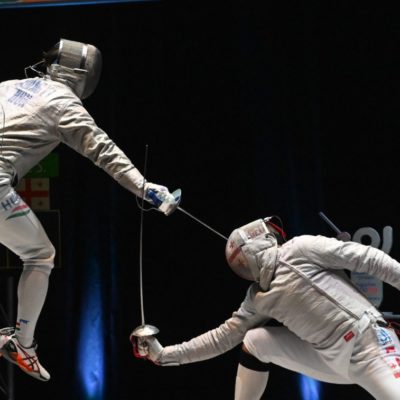The Olympic sport of fencing is comprised of three weapons: foil, epee, and sabre. All are fenced on a long rectangular strip, and electronic scoring aids are normally used to assist in the detection of touches.
The Olympic sport of fencing is comprised of three weapons: foil,
epee, and sabre. All are fenced on a long rectangular strip, and
electronic scoring aids are normally used to assist in the
detection of touches. The rules governing these three weapons
are determined by the FIE (Federation Internationale d'Escrime).
Briefly, the FIE weapons are described as follows:
Foil: Descended from the 18th century small sword, the foil has a
thin, flexible blade with a square cross-section and a small
bell guard. Touches are scored with the point on the torso of
the opponent, including the groin and back. Foil technique
emphasizes strong defense and the killing attack to the body.
Epee: Similar to the duelling swords of the late 19th century,
epees have stiff blades with a triangular cross section,
and large bell guards. Touches are scored with the point,
anywhere on the opponent's body. Unlike foil and sabre, there
no rules of right-of-way to decide which attacks have precedence,
and double hits are possible. Epee technique emphasises timing,
point control, and a good counter-attack.
Sabre: Descended from duelling sabres of the late 19th century,
which were in turn descended from naval and cavalry swords, sabres
have a light, flat blade and a knuckle guard. Touches can be
scored with either the point or the edge of the blade, anywhere
above the opponent's waist. Sabre technique emphasises speed,
feints, and strong offense.
The most popular of eastern fencing techniques is kendo, the Japanese
"Way of the Sword". Kendo is fought with a bamboo shinai, intended
to resemble a two-handed Japanese battle sword. Combatants wear
armour, and strike to the top or sides of the head, the sides of the
body, the throat, or the wrists. Accepted technique must be
observed, and judges watch for accuracy, power, and spirit. See the
Japanese Sword Arts FAQ for more information.





